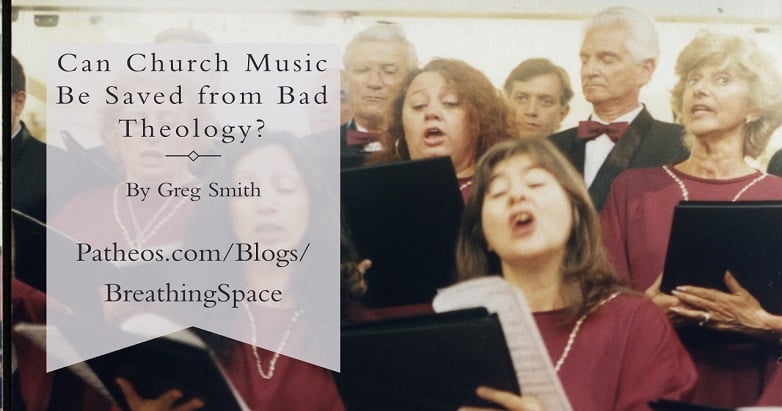Has your changing faith made certain church songs difficult for you to sing? Does Christian music communicate things about God that you no longer believe?

In my last article, I wrote about bad theology in church music. Bloody songs can repulse people who are new to the church. Violent, nationalistic, and racist lyrics can send people the wrong message about Jesus, the Prince of Peace. “Worm theology” convinces people that they are nothing more than miserable, wormy, wretches, who are unworthy of grace. When we sing songs that reflect theories of atonement that reflect a vengeful God who delights in bloodshed, we misunderstand the nature of God’s love.
In a moment, we’ll explore ways to save church music from bad theology. But first, in addition to violent, nationalistic, and racist lyrics, I must mention one other bit of poor songwriting—the kind that makes you cringe.
Jesus Is My Boyfriend
It seems every generation has music that mixes romantic imagery with Christian devotion. Bernard of Clairvaux was a medieval monk and mystic who composed a rule for the Knights Templar. He also wrote 86 sermons on the Song of Songs, exploring the connection between erotic and divine love. This isn’t entirely a bad thing—romantic love is one of the closest analogies to divine love. But sometimes it can get a bit creepy.
In my parents’ generation, Bill and Gloria Gaither sang, “He Touched Me”:
He touched me, oh, he touched me!
And oh, the joy that floods my soul!
Something happened, and now I know—
He touched me and made me whole.”
Austin Miles’ song, “In the Garden” was a favorite of my grandparents’ generation. These lyrics sound much like the Song of Songs, and use the language of a romantic tryst:
I come to the garden alone,
While the dew is still on the roses;
And the voice I hear, falling on my ear,
The Son of God discloses.Refrain: And He walks with me, and He talks with me,
And He tells me I am His own,
And the joy we share as we tarry there,
None other has ever known.He speaks, and the sound of His voice
Is so sweet the birds hush their singing;
And the melody that He gave to me
Within my heart is ringing.I’d stay in the garden with Him
Tho’ the night around me be falling;
But He bids me go; thro’ the voice of woe,
His voice to me is calling.
Contemporary Christian music continues in this genre. Jesus Culture’s song “How He Loves Us” (Lyrics by John Mark McMillan) is full of romantic language with a disturbing bent. First, the lyrics make you question what kind of abusive boyfriend Jesus really is:
He is jealous for me
Love’s like a hurricane, and I am a tree
Bending beneath the weight of His wind and mercy
When all of a sudden,
I am unaware of these afflictions eclipsed by glory
And I realize just how beautiful you are
And how great your affections are for me.
Jesus is a domineering boyfriend Jesus seems in this song. Bending his lover with the weight of a hurricane, he imposes his will. It’s unclear whether the “afflictions” the songwriter mentions are from the world, or whether these pains are part of God’s controlling love. Either way, the poet seems to be into it.
Then, you get completely distracted by the lyric, “Heaven meets earth like a sloppy wet kiss, and my heart turns violently inside of my chest.” The only positive that came out of this song is that the Christian community complained about the “sloppy wet kiss,” and it was changed to “unforeseen kiss.” But even then, we’re left to ponder how disturbing most unexpected kisses are in their own right. Where’s the consent in that?
Can Church Music Be Saved?
Many Evangelicals deconstructing their religion leave the church entirely—in part because they can’t stand the music anymore. Others give up contemporary worship for the medieval-sounding music of high church liturgy, and they seem content with that. Yet many deconstructing Christians remain in Evangelicalism because they can’t exchange a worship style they love for one they hate, even for the sake of better theology. No matter what you choose, if you can’t stand your church music, it’s going to be an uphill battle. The question remains—can church music be saved? There are several approaches a church might take:
- Try to Get Used to a Style You Hate—Or Not
Once, during Lent, I decided to go vegetarian. At first, it was difficult because I hated tofu, black beans, and other meat substitutes. But then I discovered the versatile mushroom, and everything changed. Another time, I decided to go low-carb (not no-carb—jeesh!). It was so difficult for me until I learned how to make ice cream from frozen bananas, and how to put spaghetti sauce on top of broccoli instead of pasta. After a period of adjustment, I came to like the new diet.
Some say it’s the same thing when an Evangelical deconstructs their faith and moves to a mainline denomination. They may yearn for the vibrance and energy of contemporary worship bands like I craved junk food when I tried to eat better. They say those cravings will pass if you dig into the richness of the better theology in carefully selected songs. Hopefully, a steady diet of healthier music will eventually kick your cravings.
OR NOT! Personally, when I look at musical tofu and mung beans, I just say, “blech!” I know it might be healthier, but if I don’t like it, I don’t like it. I like the kind of down-home music I grew up with. And I like the contemporary sound of modern worship music. I’m sure some other exvangelicals have got to share my feelings! So, what’s a person to do? And what’s a church to do if you want people to enjoy healthy music?
- Select Better Songs
When I was a pastor, I used to keep a running list of song suggestions for my ministers of music. It’s important for church leaders to be intentional about the selections they introduce to their congregation. Yes—there is good music out there! And yes, your church can learn it! Keep an open mind, and an ear out for the good stuff, and teach it to your church.
- Get Rid of the Bad Songs
I also kept a list of songs that desperately needed to be eliminated from our repertoire. Sometimes my music ministers listened. Often, they didn’t. These were precious people raised in the churches or communities where they served. They simply sang whatever they liked—usually what they grew up singing—without any regard to the theology they conveyed. When I tried to address this with them, they thought I was just complaining, or being nitpicky. But, if you can get them to listen, it’s invaluable to have musical allies who understand your church’s theological vision and are willing to ditch songs with bad theology.
- Change the Lyrics
Some songs are just too beloved by the church to get rid of entirely. This is why publishers often change the lyrics. As a writer, I used to oppose changing an author’s lyrics, but as long as it is done within copyright law, it’s on the up and up. You have to check the copyright status of each song if you want to change them. Changing lyrics may be the best way to save a perfectly good song that just has a bad word or two.
Of course, sometimes copyright laws, or determined (stubborn?) songwriters can often prevent this. Bob Smietana of USA Today writes about the Presbyterian attempt to change the lyrics of the favorite song, “In Christ Alone.” The original lyric conveys a violent theology that says, “on that cross, as Jesus died, the wrath of God was satisfied.” Presbyterians attempted to change the lyric to “the love of God was magnified.” But the writers, Stuart Townsend and Keith Getty, would not allow it. So, officially changing the lyrics may not be an option in every case.
If You’re Not in Charge of the Music
Maybe you’ve gotten this far in the article, and you say, “That’s all well and good, but I’m not in charge of church music.” You feel there’s nothing you can do about the bad theology in the songs your church sings because you’re in the congregation, not behind the director’s music stand. If that’s you, I’m right there with you! Now that I’m in social services and no longer pastor a church, I’m an attendee like you. Here’s what I do—and you can do the same:
- Voice Your Opinion. Your pastor may have been trying to get the music minister to select better songs, ditch bad ones, or change the lyrics for years. Maybe all your music director needs is to hear congregants tell them the same thing the pastor has been saying. Your perspective matters more than you know. Church leaders understand that if one person feels that way, others do too. You can make a change in the theology of your church music.
- Change the Lyrics (Unofficially) Yourself. At times when I’m in church singing along, a bad lyric comes up that has not already been thoughtfully edited by the publisher. In those cases, I give myself the license to change the words myself. “In Christ Alone” is a favorite in the church I attend, and I always change it to the Presbyterian lyrics as I sing. Copyright laws may prevent a church or denomination from altering the words, but they can’t keep me from singing whatever I want in the pew. People might look askance if they hear me singing something different from everyone else. But it can also be an opportunity to have conversations with them about the lyrics they are singing.
Deconstruction Doesn’t Have to Kill Church Music
Deconstruction can be a real downer to appreciating church music. When I began to unpeel my theology like an onion, I deleted so many songs from my personal repertoire! If I was in a congregation that happened to be singing them, I either stood silently or developed a coughing fit when objectionable lyrics came up. I confided to my wife how so many of my favorite songs were no longer meaningful to me. I told her that I missed these old songs that used to give me goosebumps. I told her that my deconstruction was ruining my love of Christian music.
“You’re overthinking it,” she told me. “Church music is supposed to connect you to your emotions.” Then in one phrase, she solved my problem. “If you feel it, sing it.”
If I needed permission to continue to love a song with which I disagree theologically, she just spoke that benediction. I don’t need to worry about the theology the songwriter intended. For the moment the lyrics are on my lips, that song belongs to me. It’s my expression of worship and love for God, and I can sing it however I want. If I need to change the lyric, I can. If I sing the words as written, but my heart can give it a deeper meaning, that’s something worth celebrating! If you can read a psalmist’s depression and disdain without making it your own, you can read a hymn writer’s bad theology and understand it’s their theology, not yours. I can sing John Newton’s famous hymn and know that God saved a wretch like him, without seeing myself that way.
The over-thinking process of deconstruction doesn’t have to kill church music for you. For simply a second, while lifting your heart to God with all the other believers, you can put down your defenses, just feel, and just sing.












